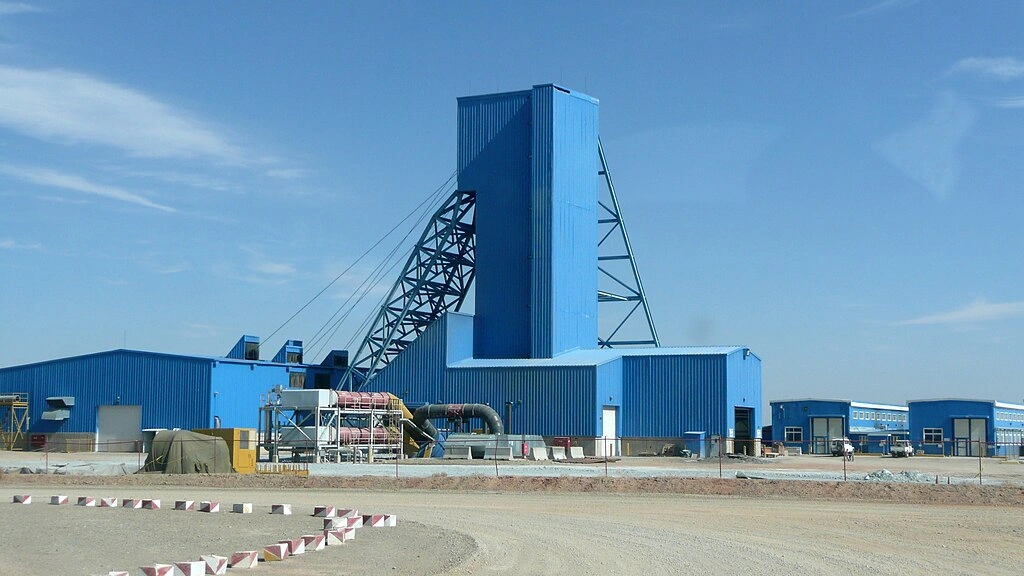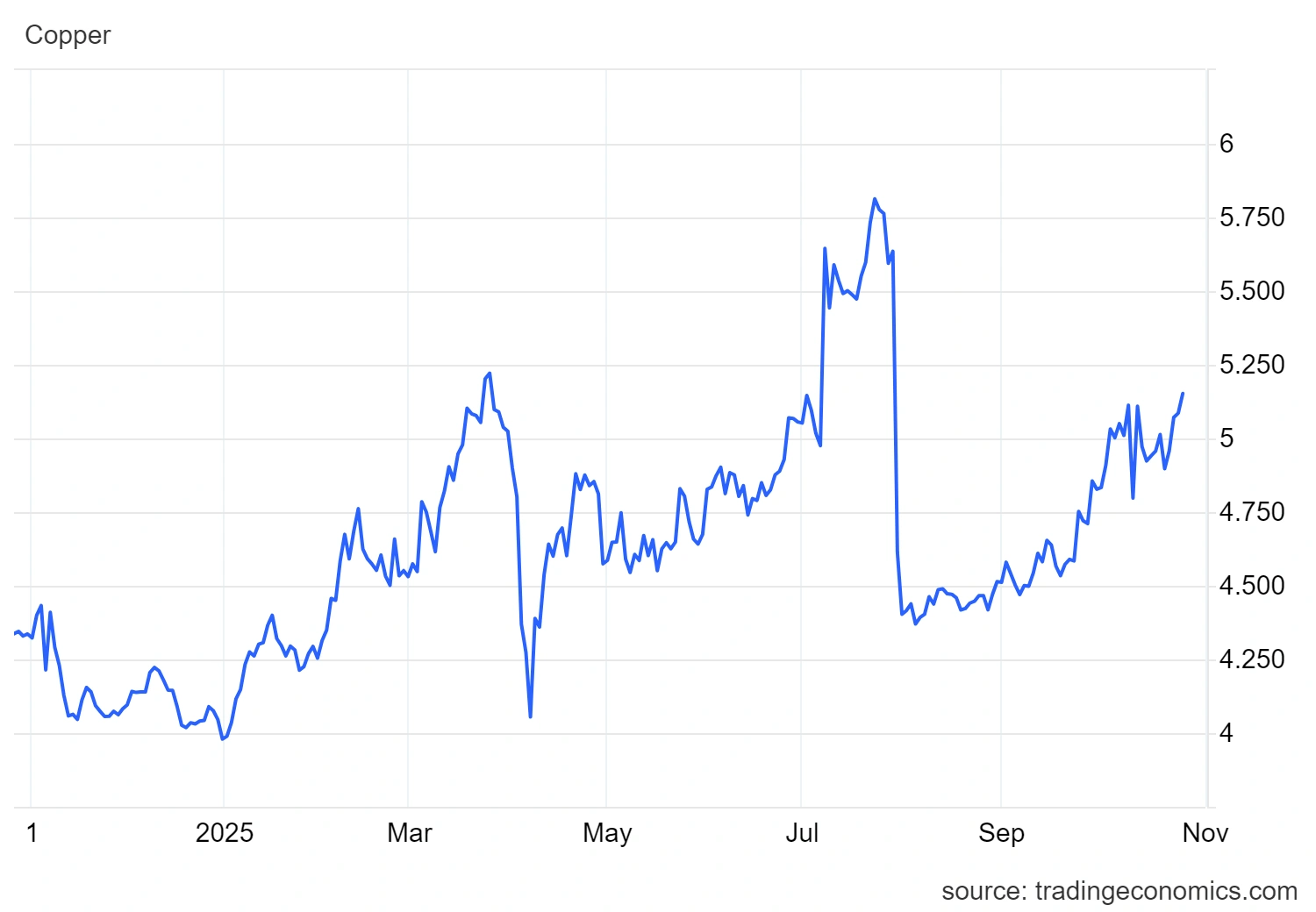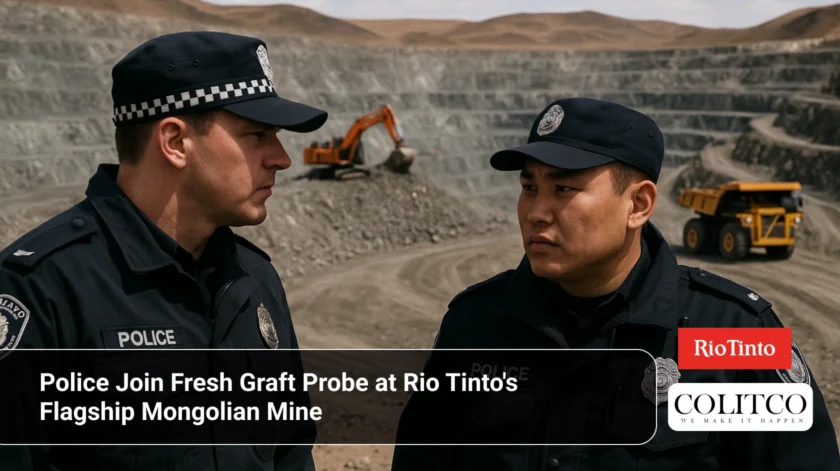Rio Tinto’s Oyu Tolgoi copper mine in Mongolia has become the centre of a new corruption investigation after the mining giant confirmed it has sought cooperation from law enforcement authorities.
The development marks yet another chapter in the troubled history of one of the world’s largest copper projects, which has been plagued by cost overruns, delays, and repeated allegations of misconduct since its inception.
Investigation Targets Procurement Activities
Oyu Tolgoi LLC, Rio Tinto’s subsidiary operating the massive copper-gold mine in Mongolia’s South Gobi Desert, announced on 26 October 2025 that it is conducting a comprehensive internal investigation into allegations involving procurement-related activities.
“We are aware of allegations involving procurement-related activities, and are conducting a comprehensive internal investigation, and have sought cooperation of law enforcement authorities,” the company stated on social media.
The mining operator provided no further details about the specific nature of the allegations or which law enforcement agencies have been engaged. The statement emphasised that “as the investigation is ongoing, we are unable to provide further comment at this time.”
 Rio Tinto’s Oyu Tolgoi copper mine
Rio Tinto’s Oyu Tolgoi copper mine
A History of Controversy
Misconduct and corruption allegations are nothing new at Oyu Tolgoi. The project has faced scrutiny from multiple angles since the original investment agreement was signed in 2009.
Key controversies include:
- 2018-2019: Mongolia’s Anti-Corruption Authority requested financial data related to the 2009 investment agreement
- 2019: Former finance minister Bayartsogt Sangajav was arrested on suspicion of “abuse of power” related to the original negotiations
- 2020: Whistleblower allegations emerged claiming Rio Tinto knew about cost overruns and delays months before public disclosure
- 2021: UK Financial Conduct Authority probed potential listing rule breaches regarding project valuation disclosures
- 2025: Fresh US$438 million tax claim filed by the Mongolian government
The latest investigation comes as Rio Tinto strengthens its North American expansion strategy and positions itself as a leader in critical minerals for the energy transition.
The Stakes: A Strategic Asset Under Pressure
Oyu Tolgoi represents Rio Tinto’s most important copper growth project. When operating at full capacity by 2028, the mine is expected to produce 500,000 tonnes of copper annually, making it one of the world’s three largest copper operations.
The project’s strategic importance extends beyond Rio Tinto’s balance sheet. Mongolia’s government owns 34% of Oyu Tolgoi through its Erdenes Oyu Tolgoi entity, while Rio Tinto controls the remaining 66% following its US$3.3 billion buyout of Turquoise Hill Resources in 2022.
That acquisition itself came after years of tensions between Rio and its minority partner over funding disputes and governance issues.
Cost Blowouts and Delays
The underground expansion of Oyu Tolgoi has been beset by massive cost increases and timeline delays. Initial estimates placed the expansion cost at around US$5 billion, but by 2019 the figure had ballooned to US$6.75 billion.
A 2021 class-action lawsuit in the United States, which Rio Tinto settled for US$138.75 million, accused the company of fraudulently concealing the true extent of these problems from investors.
Shareholders claimed Rio and Turquoise Hill falsely assured markets the expansion was “on schedule” and “on budget” despite falling up to two and a half years behind and running US$1.9 billion over budget.

Copper prices remain elevated amid supply concerns and growing demand from renewable energy projects
Geopolitical Complications
The fresh corruption probe arrives at a sensitive moment for Mongolia-Rio Tinto relations. In early 2025, the Mongolian government filed a US$438 million tax claim against Oyu Tolgoi LLC, adding to existing tensions.
Mongolia’s leadership has shown increasing signs of resource nationalism, with former President Khaltmaa Battulga previously expressing desires to reduce foreign control over the country’s natural resources.
These political dynamics are complicated by Oyu Tolgoi’s location just 80 kilometres from the Chinese border. Most of the mine’s copper concentrate is transported overland to China for processing, making the project strategically important for Beijing as well as Ulaanbaatar.
The project has also faced scrutiny over environmental impacts, particularly water usage in the desert ecosystem. Local herder communities have raised concerns about dust, groundwater depletion, and ecological degradation.
Broader Context: Rio Tinto’s Governance Challenges
The Oyu Tolgoi investigation is the latest in a series of governance challenges facing Rio Tinto. The mining giant continues to grapple with fallout from its 2020 destruction of the Juukan Gorge, a 46,000-year-old Aboriginal heritage site in Western Australia.
That incident led to the departure of CEO Jean-Sebastien Jacques and sparked a company-wide review of its relationship with Indigenous communities and cultural heritage management.
More recently, Rio Tinto has faced allegations of rising sexual assault and bullying despite efforts to reform workplace culture.
The company has tied executive bonuses to implementing reforms, but progress remains uneven across its global operations.
Market Implications
Rio Tinto’s share price has shown resilience despite the accumulation of controversies. The stock has benefited from strong copper demand driven by electrification and renewable energy infrastructure buildout.
However, governance risks and operational challenges at flagship assets like Oyu Tolgoi could weigh on valuations if investigations reveal serious misconduct or lead to regulatory penalties.
The company’s recent investments in gallium extraction, lithium projects, and iron ore expansion demonstrate its strategy to diversify revenue streams beyond any single operation.
Yet Oyu Tolgoi remains central to Rio’s copper ambitions, with the underground expansion representing billions of dollars in sunk costs and future revenue potential.
Also Read: Why Australia’s Critical Minerals Boom Faces an Uncomfortable Truth
What Happens Next?
The procurement investigation joins several other legal and regulatory processes surrounding Oyu Tolgoi, including:
- Ongoing UK corruption probes related to earlier project approvals
- Mongolian tax dispute proceedings
- Environmental compliance reviews
- Community relations assessments
Rio Tinto’s ability to bring the underground expansion to full production by 2028 depends not only on technical execution but also on maintaining acceptable relationships with Mongolian authorities, managing reputational risks, and demonstrating robust governance.
The company has pledged to cooperate fully with law enforcement while conducting its internal review. Whether this latest investigation uncovers systemic issues or isolated incidents could significantly impact both Rio Tinto’s operations and broader investor confidence in the mining sector’s governance standards.
For now, Oyu Tolgoi continues producing copper from both open-pit and initial underground operations. But the shadow of yet another corruption probe hangs over what should be one of Rio Tinto’s crown jewels.












